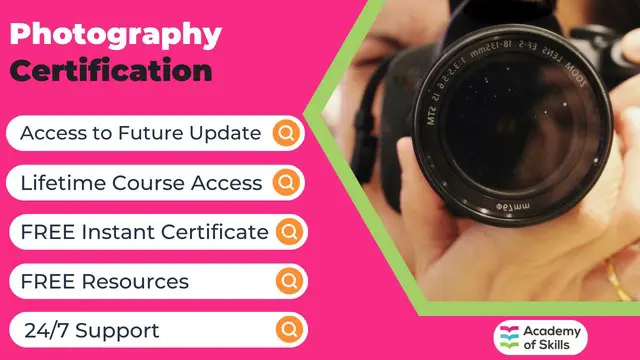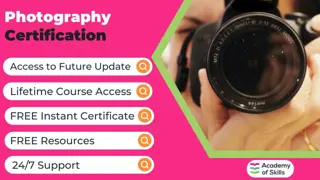
Photography Certification
Top Course | FREE Instant Certificate | Mentor Support | No Hidden Charges | Instant Access
Academy of Skills
Summary
- Reed Courses Certificate of Completion - Free
- Tutor is available to students
Add to basket or enquire
Overview
Photography Certification ; Do you wish you could learn a new skill set in order to get that Photography Certification job? Continue reading!
Our teachers present the skills and frameworks that assist learners to overcome the relevant subject matters in this Photography Certification Course. The entire Photography Certification course is jam-packed with all of the necessary insights and examples from the theoretical and practical parts of the relevant subject; also, this Photography Certification course is created for any creative student who needs it.
Academy of Skills will provide all the resources and structure essential for students to pass all sections of this Photography Certification course. You'll get access to a varied group of well-known academics and industry professionals. Furthermore, you will collaborate with a diverse group of students from across the world to address real-world challenges. To ensure that you flourish in your job, we have packed the whole Photography Certification course with crucial insights and examples of both theoretical and practical elements of Photography Certification.
This premium online Photography Certification course ensures the growth of your professional skills while also providing international accreditation. All of the themes and subtopics in Photography Certifications are organised scientifically, taking into account the psychology of the learner and their total learning experience. The Photography Certification modules are all simple to comprehend, interactive, and bite-sized. You will be able to learn Photography Certification at your own speed, from any location, using any device that is appropriate. The Academy of Skills offers an internationally recognized certification for this Photography Certification course.
Certificate
Learners can request a FREE PDF Certificate of completion after successfully completing the Photography Certification course. An additional fee may be charged for Photography Certification Hardcopy Certificate and includes Free Shipping in the UK.
Certificates
Reed Courses Certificate of Completion
Digital certificate - Included
Will be downloadable when all lectures have been completed.
Curriculum
-
Landscape Photography Certification Course 6:01:32
- 1: Introduction to Nature Photography Course Preview 02:17
- 2: What is Landscape Photography 01:26
- 3: Introduction 01:19
- 4: Overall 01:07
- 5: Camera 02:17
- 6: Sensor Size 02:51
- 7: Sensors 02:15
- 8: Lenses 03:06
- 9: Prime VS Zoom 01:56
- 10: Pro VS Budget Lenses 02:59
- 11: Prime Lenses 01:43
- 12: Tripods 02:18
- 13: Filters 01:34
- 14: Tripod 03:21
- 15: Accessories 05:23
- 16: Filters 01:54
- 17: Other Accessories 03:50
- 18: Introduction 00:46
- 19: ISO 02:40
- 20: What Is Iso 01:52
- 21: Iso Practical 02:06
- 22: ISO Practical 02:37
- 23: ISO Practical Night 02:08
- 24: What Is Aperture 01:45
- 25: Practical Of Aperture 02:46
- 26: Shutter Speed 01:24
- 27: Practical of Shutter Speed 02:53
- 28: What Is Shutter Speed 03:05
- 29: Shutter Speed Practical 03:42
- 30: Shutter Speed Waterfall 04:16
- 31: Aperture 02:38
- 32: Exposure Triangle 02:45
- 33: Practical of Aperture 04:32
- 34: Aperture in Low Light Photography 02:51
- 35: Exposure Triangle 03:24
- 36: Aperture Priority 02:53
- 37: Introduction 01:49
- 38: Introduction 01:15
- 39: Histogram 02:33
- 40: Histogram 02:58
- 41: Expose to the Right 02:06
- 42: Raw Vs Jpeg 02:41
- 43: Metering Modes 01:38
- 44: What Is Raw 02:06
- 45: Dynamic Range 03:16
- 46: Exposure Compensation 02:16
- 47: Kelvin Temp 02:34
- 48: RAW vs JPEG 02:41
- 49: What is RAW 02:06
- 50: Dynamic Range 02:37
- 51: White Balance 02:30
- 52: Introduction to Focusing 01:24
- 53: Hyperfocal Distance VS Single Point Focusing 03:20
- 54: Aperture in Focusing 01:47
- 55: Aperture + Focusing + Lens 02:59
- 56: Focusing with a Wide-Angle Lens 04:34
- 57: Focusing for Telephoto Photography 03:56
- 58: What is a Polarizing Filter 02:18
- 59: How a Polarizer Works near Waterfalls 03:24
- 60: How a Polarizer Works reducing Haze 03:11
- 61: What is a ND Filter 01:45
- 62: ND Filter to achieve Silky Water 03:59
- 63: What is Colour Cast 02:02
- 64: Introduction to Exposure 01:27
- 65: Dynamic Range + Expose to the Right 03:36
- 66: The Impact of Light in photography 02:54
- 67: Finding the correct Light 03:55
- 68: Single Expoure Sunset Photography 04:15
- 69: Why Exposure Bracketing Helps you take BETTER images 04:45
- 70: Introduction 00:58
- 71: Elements of Composition 02:31
- 72: Rules of Third 04:08
- 73: Framing A Subject 02:02
- 74: Leading Lines 05:22
- 75: Diagonals 03:03
- 76: Using S and Z Curves 05:12
- 77: Changing Perspective with different Focal Ranges 05:19
- 78: Change Perspective through Framing 02:07
- 79: Simple Reflection Photography 03:13
- 80: Wide-Angle Photography 03:55
- 81: Telephoto Photography 05:37
- 82: Focus Stacking 11:47
- 83: Panoramic 06:59
- 84: Creating Scale 03:05
- 85: Minimalist Nature Photography 04:20
- 86: Creating Leading Lines from Long Exposure 04:17
- 87: Introduction to Photo Editing 01:07
- 88: Editing in Lightroom 06:09
- 89: Global Adjustments 21:05
- 90: Local Adjustments 11:44
- 91: Histogram (Expose to the right!) 06:49
- 92: Grad Filter Effect 12:28
- 93: Editing an image like a PROFESSIONAL 17:28
- 94: How to Focus Stack 11:46
- 95: How to REMOVE Colour Cast 03:38
- 96: How to blend multiple images together 05:21
- 97: How to stitch a PANO 06:46
-
Night Photography Certification Course 4:25:59
- 98: Introduction 02:20
- 99: What is Night Photography 01:26
- 100: Introduction 01:19
- 101: Camera 02:17
- 102: Sensor Size 02:51
- 103: Lenses 03:06
- 104: Prime VS Zoom 01:56
- 105: Tripods 02:18
- 106: Filters 01:34
- 107: Accessories 05:23
- 108: Introduction 00:46
- 109: What Is Iso 01:52
- 110: Iso Practical 02:06
- 111: What Is Aperture 01:45
- 112: Practical Of Aperture 02:46
- 113: What Is Shutter Speed 03:05
- 114: Shutter Speed Practical 03:42
- 115: Exposure Triangle 02:45
- 116: Introduction 01:15
- 117: Histogram 02:58
- 118: Raw Vs Jpeg 02:41
- 119: What Is Raw 02:06
- 120: Dynamic Range 03:16
- 121: Kelvin Temp 02:34
- 122: Introduction 01:56
- 123: Light Pollution 03:21
- 124: Weather App 03:06
- 125: Photopills 06:12
- 126: Feature of PhotoPills 06:52
- 127: PRO TIP for night sky planning 03:25
- 128: How to focus 07:15
- 129: Base Settings 02:09
- 130: Base Setting Practical 02:07
- 131: Underexposed 02:15
- 132: Overexposed 1 02:16
- 133: Overexposed 2 03:17
- 134: PRO TIP Find Composition FAST! 02:08
- 135: Introduction 01:50
- 136: Foreground 03:04
- 137: Scale 02:31
- 138: Reflection 03:21
- 139: Low Light Cityscape Photography 03:39
- 140: Creating Simple Light Trails 03:28
- 141: Light Pollution Filter 02:25
- 142: Exposure Blending 03:19
- 143: Artifical Light 02:40
- 144: Focus Stacking 03:36
- 145: Time-Lapse 04:34
- 146: Star Trails 03:27
- 147: Introduction 01:31
- 148: Basic Overview 19:10
- 149: Global VS Local Adjustments 09:19
- 150: Editing Night Photography Images 21:55
- 151: Artifical Light 15:07
- 152: Blending Multiple Exposure 13:01
- 153: Focus Stack (Photoshop PROPER) 07:14
- 154: Focus Stack (Helicon Focus) 05:55
- 155: Time Lapse 05:43
- 156: Star Trails (StarstaX) 11:14
- 157: Adobe Lightroom PRO TIPS 13:30
-
Photography Editing Certification Course 6:03:02
- 158: Introduction 03:00
- 159: Editing Overview 02:21
- 160: Import, Catalog & Sub Folder 05:24
- 161: Advanced Organising 04:24
- 162: Hidden Gem of Lightroom 03:24
- 163: Overview of Lightroom Panels 04:08
- 164: Learn the Histogram 05:00
- 165: Local Adjustments 09:35
- 166: Basic Global Adjustments 08:51
- 167: Tone Curves 04:55
- 168: Hue, Saturation & Luminance 04:53
- 169: Split Toning 03:24
- 170: Sharpening & Noise Reduction 06:06
- 171: Lens Correction 03:23
- 172: Transform 02:16
- 173: Effects & Calibration 02:41
- 174: Landscape 17:09
- 175: Cityscape 18:16
- 176: Blue Hour 18:07
- 177: Small Sensor 13:33
- 178: Low Light 10:12
- 179: Milky Way 20:20
- 180: Reflection 14:38
- 181: Waterfall 14:46
- 182: Winter 14:29
- 183: Sunrise 11:59
- 184: Travel Portraits 12:08
- 185: Architecture 11:23
- 186: HDR 13:00
- 187: Panoramic 14:53
- 188: HDR Panoramic 05:01
- 189: Cloaning & Removing 06:31
- 190: Presets 05:10
- 191: Dodge & Burn 08:57
- 192: Orton Effect 04:46
- 193: Sun Flare 04:03
- 194: Basics Of Exporting 08:46
- 195: Exporting for Social Media 04:17
- 196: Exporting for Printing 04:12
- 197: Exporting Presets 03:05
- 198: Focus Stack 06:30
- 199: Exposure Blending 04:42
- 200: Blending Moments In Time 05:10
- 201: Advanced Object Removal 13:14
Description
With the help and knowledge of industry specialists, this novel Photography Certification course has been put together. Photography Certification has been meticulously created to fulfil the learning needs that will enable you to make a significant contribution to the area and carve out a successful career path.
Photography Certification course was created to help motivated students become the best in their personal and professional lives. Many students have already completed and enjoyed this Photography Certification course.
With the help and knowledge of industry leaders, the original Photography Certification was created. This course has been meticulously created to suit all of the learning criteria for making a significant contribution to the associated subject and subsequent career path.
After enrolling in this Photography Certification course, you may use our tutor's assistance to help you with any questions you may have, which you can send to our learner support staff through email. Enrol in the Photography Certification right now to advance your abilities.
Who is this course for?
The Photography Certification training course is ideal for highly driven students who wish to improve their personal and professional abilities while also preparing for the career of their dreams!
Requirements
- There are no official requirements for Photography Certification
- Requires a basic Internet connection
- Requires you to have access to a computer, tablet, or a mobile device
- Knowledge of basic English
Career path
The Photography Certification course is meant to prepare you for the job of your dreams, a promotion at work, or being self-employed and starting your own business. Courses from the Academy of Skills will help you enhance your profession and keep your skills current.
Questions and answers
Currently there are no Q&As for this course. Be the first to ask a question.
Reviews
Currently there are no reviews for this course. Be the first to leave a review.

Add to basket or enquire
Course provided by
Legal information
This course is advertised on reed.co.uk by the Course Provider, whose terms and conditions apply. Purchases are made directly from the Course Provider, and as such, content and materials are supplied by the Course Provider directly. Reed is acting as agent and not reseller in relation to this course. Reed's only responsibility is to facilitate your payment for the course. It is your responsibility to review and agree to the Course Provider's terms and conditions and satisfy yourself as to the suitability of the course you intend to purchase. Reed will not have any responsibility for the content of the course and/or associated materials.

